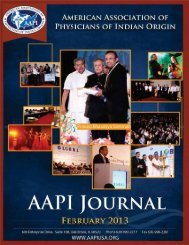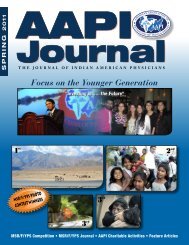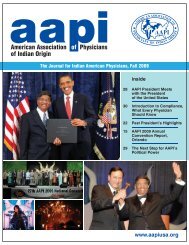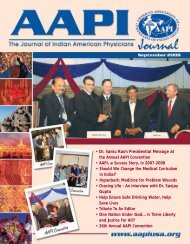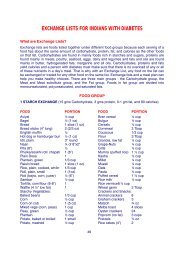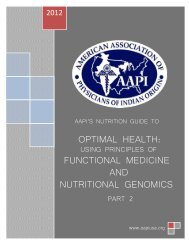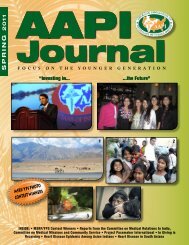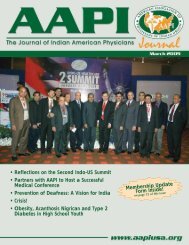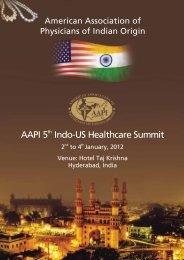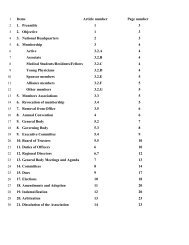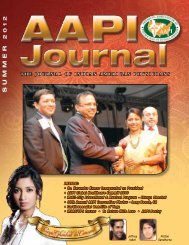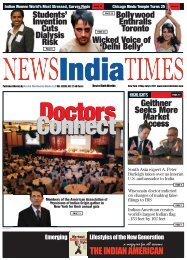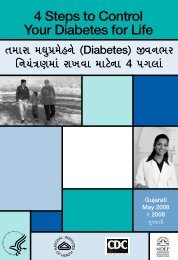functional medicine and nutritional genomics - American Association ...
functional medicine and nutritional genomics - American Association ...
functional medicine and nutritional genomics - American Association ...
Create successful ePaper yourself
Turn your PDF publications into a flip-book with our unique Google optimized e-Paper software.
AAPI’S NUTRITION GUIDE TO OPTIMAL HEALTH: USING PRINCIPLES OF FUNCTIONAL MEDICINE AND NUTRITIONAL GENOMICS<br />
12<br />
Getting Unstuck<br />
James S. Gordon,<br />
MD<br />
Introduction<br />
Depression is not a disease, the end point of a<br />
pathological process. It is a sign that our lives<br />
are out of balance, that we’re stuck. It’s a wakeup<br />
call <strong>and</strong> the start of a journey that can help<br />
us become whole <strong>and</strong> happy, a journey that can<br />
change <strong>and</strong> transform our lives.<br />
The approach I use challenges the prevailing<br />
‚medical model‛ of depression <strong>and</strong> the<br />
widespread, even epidemic, use of chemical<br />
antidepressants. This narrow model of diagnosis<br />
<strong>and</strong> treatment insists that those who feel helpless<br />
<strong>and</strong> hopeless, unhappy <strong>and</strong> uncertain have a<br />
disease, like insulin-dependent diabetes that<br />
requires pharmacological treatment. There is<br />
evidence that strongly suggests that this model is<br />
poorly justified, largely inappropriate, limited <strong>and</strong><br />
limiting, <strong>and</strong>, often enough, dangerous to your<br />
physical, emotional <strong>and</strong> spiritual health. The<br />
antidepressants that it dictates should be used<br />
seldom—as a last resort <strong>and</strong> generally briefly—not<br />
as a form of primary care.<br />
What I’m sharing with you in the case history<br />
that follows is a newer, more hopeful <strong>and</strong> far<br />
more comprehensive <strong>and</strong> effective model for<br />
107<br />
healing depression—both the clinical depression<br />
that is diagnosed in sixteen to eighteen million<br />
<strong>American</strong>s each year <strong>and</strong> chronic, low-grade<br />
dissatisfaction, unhappiness, <strong>and</strong> anxiety that affect<br />
so many more of us. It’s a model you can<br />
incorporate into your work now, one that will meet<br />
your patients’ unique individual needs <strong>and</strong> give<br />
them positive results that they can begin to<br />
experience immediately.<br />
This Unstuck approach marries modern science<br />
with the perennial wisdom of the world’s great<br />
psychological <strong>and</strong> spiritual traditions. It makes use<br />
of the remarkable capacity each of us has to<br />
recover—physically, emotionally, spiritually—from the<br />
hurts <strong>and</strong> trauma we have experienced, to<br />
transform our fears into teachers, <strong>and</strong> to restore<br />
<strong>and</strong> renew our brain, body, mind <strong>and</strong> spirit.<br />
Here is how I used this approach with one<br />
patient. It will give you a feeling for what is<br />
possible, for what you can also do.<br />
Theresa, a 37-year-old African-<strong>American</strong> civil<br />
rights lawyer, tells me in our first session together<br />
that she has been miserable for a month. During<br />
that time she's dropped weight she can ill afford<br />
to lose <strong>and</strong> has been sleeping only four to five<br />
2012



